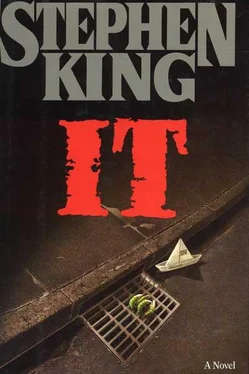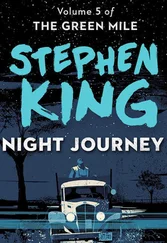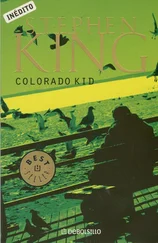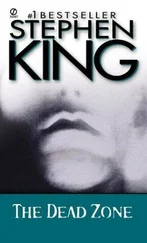Stephen King - It
Здесь есть возможность читать онлайн «Stephen King - It» весь текст электронной книги совершенно бесплатно (целиком полную версию без сокращений). В некоторых случаях можно слушать аудио, скачать через торрент в формате fb2 и присутствует краткое содержание. Год выпуска: 1986, Жанр: Ужасы и Мистика, на английском языке. Описание произведения, (предисловие) а так же отзывы посетителей доступны на портале библиотеки ЛибКат.
- Название:It
- Автор:
- Жанр:
- Год:1986
- ISBN:нет данных
- Рейтинг книги:4.33 / 5. Голосов: 3
-
Избранное:Добавить в избранное
- Отзывы:
-
Ваша оценка:
- 80
- 1
- 2
- 3
- 4
- 5
It: краткое содержание, описание и аннотация
Предлагаем к чтению аннотацию, описание, краткое содержание или предисловие (зависит от того, что написал сам автор книги «It»). Если вы не нашли необходимую информацию о книге — напишите в комментариях, мы постараемся отыскать её.
It — читать онлайн бесплатно полную книгу (весь текст) целиком
Ниже представлен текст книги, разбитый по страницам. Система сохранения места последней прочитанной страницы, позволяет с удобством читать онлайн бесплатно книгу «It», без необходимости каждый раз заново искать на чём Вы остановились. Поставьте закладку, и сможете в любой момент перейти на страницу, на которой закончили чтение.
Интервал:
Закладка:
I laughed a little and Carson grinned with his leathery lips-an expression of good humor that was actually a little frightening. In that instant he looked like a vulture happily guarding a freshly killed animal, waiting for it to reach exactly the right stage of tasty decomposition before beginning to dine.
“When you finish with Buddinger, read Ives. Make notes on all the people he talked to. Sandy Ives is still at the University of Maine. Folklorist. After you read him, go see him. Buy him a dinner. I’d take him to the Orinoka, because dinner at the Orinoka seems to never end. Pump him. Fill up a notebook with names and addresses. Talk to the old-timers he’s talked to-those that are still left; there are a few of us, ah-hah-hah-hah!-and get some more names from them. By then you’ll have all the place to stand you’ll need, if you’re half as bright as I think you are. If you chase down enough people, you’ll find out a few things that aren’t in the histories. And you may find they disturb your sleep.”
“Derry…”
“What about it?”
“Derry’s not right, is it?”
“Right?” he asked in that whispery croak. “What’s right? What does that word mean? Is “right” pretty pictures of the Kenduskeag at sunset, Kodachrome by so-and-so, f-stop such-and-such? If so, then Derry is right, because there are pretty pictures of it by the score. Is right a damned committee of dry-boxed old virgins to save the Governor’s Mansion or to put a commemorative plaque in front of the Standpipe? If that’s right, then Derry’s right as rain, because we’ve got more than our share of old kitty-cats minding everybody’s business. Is right that ugly plastic statue of Paul Bunyan in front of City Center? Oh, if I had a truckful of napalm and my old Zippo lighter I’d take care of that fucking thing, I assure you… but if one’s aesthetic is broad enough to include plastic statues, then Derry is right. The question is, what does right mean to you, Hanlon? Eh? More to the point, what does right not mean?”
I could only shake my head. He either knew or he didn’t. He would either tell or he wouldn’t.
“Do you mean the unpleasant stories you may hear, or the ones you already know? There are always unpleasant stories. A town’s history is like a rambling old mansion filled with rooms and cubbyholes and laundry-chutes and garrets and all sorts of eccentric little hiding places… not to mention an occasional secret passage or two. If you go exploring Mansion Derry, you’ll find all sorts of things. Yes. You may be sorry later, but you’ll find them, and once a thing is found it can’t be unfound, can it? Some of the rooms are locked, but there are keys… there are keys.”
His eyes glinted at me with an old man’s shrewdness.
“You may come to think you’ve stumbled on the worst of Derry’s secrets… but there is always one more. And one more. And one more.”
“Do you-”
“I think I shall have to ask you to excuse me just now. My throat is very bad today. It’s time for my medicine and my nap.”
In other words, here is a knife and a fork, my friend; go see what you can cut with them.
I started with the Fricke history and the Michaud history. I followed Carson’s advice and threw them in the wastebasket, but I read them first. They were as bad as he had suggested. I read the Buddinger history, copied out the footnotes, and chased them down. That was more satisfactory, but footnotes are peculiar things, you know-like footpaths twisting through a wild and anarchic country. They split, then they split again; at any point you may take a wrong turn which leads you either to a bramble-choked dead end or into swampy quickmud. “If you find a footnote,” a library-science prof once told a class of which I was a part, “step on its head and kill it before it can breed.”
They do breed, and sometimes the breeding is a good thing, but I think that more often it is not. Those in Buddinger’s stiffly written A History of Old Derry (Orono: University of Maine Press, 1950) wander through one hundred years” worth of forgotten books and dusty master’s dissertations in the fields of history and folklore, through articles in defunct magazines, and amid brain-numbing stacks of town reports and ledgers.
My conversations with Sandy Ives were more interesting. His sources crossed Buddinger’s from time to time, but a crossing was all it ever was. Ives had spent a good part of his lifetime setting down oral histories-yarns, in other words-almost verbatim, a practice Branson Buddinger would undoubtedly have seen as taking the low road.
Ives had written a cycle of articles on Derry during the years 1963-66. Most of the old-timers he talked to then were dead by the time I started my own investigations, but they had sons, daughters, nephews, cousins. And, of course, one of the great true facts of the world is this: for every old-timer who dies, there’s a new old-timer coming along. And a good story never dies; it is always passed down. I sat on a lot of porches and back stoops, drank a lot of tea, Black Label beer, homemade beer, homemade rootbeer, tapwater, springwater. I did a lot of listening, and the wheels of my tape-player turned.
Both Buddinger and Ives agreed completely on one point: the original party of white settlers numbered about three hundred. They were English. They had a charter and were formally known as the Derrie Company. The land granted them covered what is today Derry, most of Newport, and little slices of the surrounding towns. And in the year 1741 everyone in Derry Township just disappeared. They were there in June of that year-a community which at that time numbered about three hundred and forty souls-but come October they were gone. The little village of wooden homes stood utterly deserted. One of them, which once stood roughly at the place where Witcham and Jackson Streets intersect today, was burned to the ground. The Michaud history states firmly that all of the villagers were slaughtered by Indians, but there is no basis-save the one burned house-for that idea. More likely, someone’s stove just got too hot and the house went up in flames.
Indian massacre? Doubtful. No bones, no bodies. Flood? Not that year. Disease? No word of it in the surrounding towns.
They just disappeared. All of them. All three hundred and forty of them. Without a trace.
So far as I know, the only case remotely like it in American history is the disappearance of the colonists on Roanoke Island, Virginia. Every school-child in the country knows about that one, but who knows about the Derry disappearance? Not even the people who live here, apparently. I quizzed several junior-high students who are taking the required Maine-history course, and none of them knew a thing about it. Then I checked the text, Maine Then and Now. There are better than forty index entries for Derry, most of them concerning the boom years of the lumber industry. Nothing about the disappearance of the original colonists… and yet that-what shall I call it?-that quiet fits the pattern, too.
There is a kind of curtain of quiet which cloaks much of what has happened here… and yet people do talk. I guess nothing can stop people from talking. But you have to listen hard, and that is a rare skill. I flatter myself that I’ve developed it over the last four years. If I haven’t, then my aptitude for the job must be poor indeed, because I’ve had enough practice. An old man told me about how his wife had heard voices speaking to her from the drain of her kitchen sink in the three weeks before their daughter died-that was in the early winter of 1957-58. The girl he spoke of was one of the early victims in the murder-spree which began with George Denbrough and did not end until the following summer.
“A whole slew of voices, all of em babblin together,” he told me. He owned a Gulf station on Kansas Street and talked in between slow, limping trips out to the pumps, where he filled gas-tanks, checked oil-levels, and wiped windshields. “said she spoke back once, even though she was ascairt. Leaned right over the dram, she did, and hollered down into it. “Who the hell are you?” she calls. “What’s your name?” And all these voices answered back, she said-grunts, and babbles and howls and yips, screams and laughin, don’t you know. And she said they were sayin what the possessed man said to Jesus: “Our name is Legion,” they said. She wouldn’t go near that sink for two years. For them two years I’d spend twelve hours a day down here, bustin my hump, then have to go home and warsh all the damn dishes.”
Читать дальшеИнтервал:
Закладка:
Похожие книги на «It»
Представляем Вашему вниманию похожие книги на «It» списком для выбора. Мы отобрали схожую по названию и смыслу литературу в надежде предоставить читателям больше вариантов отыскать новые, интересные, ещё непрочитанные произведения.
Обсуждение, отзывы о книге «It» и просто собственные мнения читателей. Оставьте ваши комментарии, напишите, что Вы думаете о произведении, его смысле или главных героях. Укажите что конкретно понравилось, а что нет, и почему Вы так считаете.











